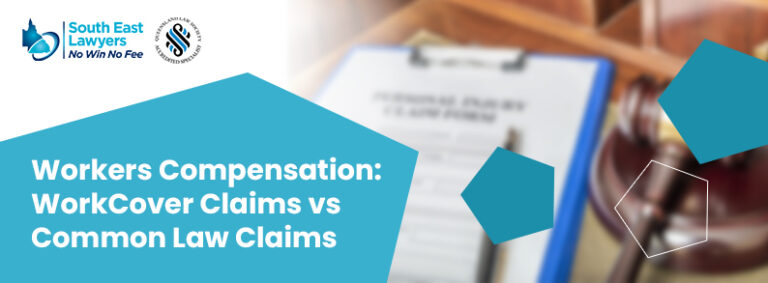Have you ever wondered, “can employers check your workers’ comp history?” Or perhaps, you are an employer wanting to understand your rights and responsibilities when it comes to accessing such sensitive information.
Regardless of your position, the legal landscape surrounding workers’ compensation history is a complex terrain to navigate. Fortunately, our expertise here at South East Injury Lawyers in Queensland, can help unravel these complexities and provide much-needed clarity on whether employers can check your workers comp history or not.
Key Takeaways
- Employers must adhere to privacy laws and regulations when obtaining workers’ compensation histories.
- Non-disclosure of pre-existing conditions can have serious potential risks, including the ineligibility to claim compensation or pursue damages.
- South East Injury Lawyers provide expert legal advice and representation for all workers’ compensation claims, offering necessary guidance on navigating this complex process.
Understanding the Legal Landscape: Employer Rights and Worker Privacy
In the state of Queensland, Australia, both employers and workers have specific rights with regard to privacy. The Fair Work Act mandates employers to keep certain employee personal information, while the Queensland Information Privacy Act 2009 ensures that individuals’ personal information, including past workers’ compensation claims, is collected and handled appropriately. This dynamic creates a delicate balance between the rights of employers to assess the fitness of prospective employees for work and the rights of workers to maintain their privacy.
Contrary to common misconceptions, employers cannot discriminate against individuals who have filed a WorkCover claim in the past, including those with existing or previous injuries. However, if an employer discovers post-hiring that an employee was deceitful on their job application, particularly about their ability to perform employment related duties, this could result in severe disciplinary action, including termination.
Navigating Workers Compensation Claims Disclosure
One of the more complex aspects of workers’ compensation claims involves the disclosure of pre-existing injuries or medical conditions. Workers are obligated to divulge all pre-existing injuries or medical conditions that may be aggravated by performing job-related duties, but only if requested in writing by the employer. It is like a dance of disclosure and discretion, where each step needs to be carefully calculated.
This disclosure process, however, is not without its potential pitfalls. For instance, if a prospective employee knowingly provides false or misleading information about their medical history, they may be deprived of the right to seek workers’ compensation if their undisclosed injury is exacerbated due to the employment.
Mandatory disclosure of pre-existing injuries when a prospective employer requests is a legal requirement in Queensland, Australia. Prospective workers need to disclose any pre-existing injuries or medical conditions during the employment period upon request from a potential employer.
Risks of Non-Disclosure
The decision to withhold information about pre-existing conditions is not without its risks. If a potential employee with a pre-existing injury deliberately provides a false or misleading disclosure about it, they may be ineligible to claim compensation or pursue damages for any exacerbation of that pre-existing injury.
Non-disclosure can also have an impact on the confidentiality of the workers’ compensation claim, especially if the injury is part of a workers’ compensation claim. Therefore, being forthright and disclosing all relevant information is essential for a fair and accurate appraisal of the claim.
Consent and Access: How Employers Obtain Workers Comp Histories
For employers, the intricacies of workers’ compensation history can be challenging to navigate. Although employers can access a worker’s compensation history with the employee’s permission, they must tread carefully to avoid infringing on privacy laws and regulations.
To keep things above board, employers can request a prospective worker to disclose all pre-existing injuries or medical conditions in writing in accordance with the legal framework. They can also access a claims history summary issued by the Workers’ Compensation Regulator, which may include any previous workers compensation claim.
Seeking Legal Advice
When it comes to workers’ compensation, obtaining legal advice can serve as a lifeline. At South East Injury Lawyers, we offer expert legal advice and representation for all workers’ compensation claims, providing assistance throughout the claims, negotiation and litigation processes.
Whether you are an employer seeking to understand the procedures for accessing workers’ compensation histories or a prospective employee wanting to know your rights and obligations, we can ensure you understand your rights and options.
The Implications of Providing False or Misleading Information
Submitting false or misleading information about pre-existing injuries or medical conditions can result in severe legal repercussions. The law views such acts as discriminatory, coercive, or misleading conduct under Part 6 of the Work Health and Safety Act 2011, with breaches of these laws resulting in fines and penalties.
In cases where false or misleading information has been present, we highly recommend seeking legal advice to see where you stand.
Employer Strategies for Pre-Employment Medical Screening
Employers often use strategies such as pre-employment medical screening to evaluate a prospective employee’s fitness for work. This procedure helps gauge the candidate’s ability to work safely and proficiently for their prospective employer.
The implementation of a comprehensive and fair pre-employment medical screening process can pose complexities. Employers must ensure compliance with privacy laws and regulations, use standardised and validated medical assessment tools, and conduct the screening in a non-discriminatory manner.
Psychological Injuries Consideration
Psychological injuries also warrant consideration during pre-employment medical screening. Psychological injury is formally defined as a condition that includes cognitive, emotional, and behavioural symptoms that detrimentally impact how a person feels, thinks, and behaves.
To ensure compliance with legislation when considering psychological injuries in pre-employment screenings, employers must request written disclosure from prospective workers regarding any pre-existing injuries or medical conditions. Moreover, screening processes should be implemented and conducted prior to an existing employee commencing in a high-risk or specialist role.
Rehabilitation Act and Workers Compensation Regulator Guidelines
In Queensland, Australia, The Workers’ Compensation and Rehabilitation Act 2003 lays out a framework for handling workers’ compensation claims. This Act supplies remunerations for workers who sustain injury and ensures their recuperation and return to work.
The Workers Compensation Regulator Guidelines also serve as a governing body for the state’s workers’ compensation scheme. These guidelines provide a framework for managing workers’ compensation and guaranteeing equitable treatment of workers. It’s like a rulebook, providing clear guidelines on how to play the game fairly.
Protecting Your Rights with South East Injury Lawyers
At South East Injury Lawyers, we’re here as your ally in safeguarding your rights in matters of workers’ compensation and disclosure. We offer legal expertise and guidance throughout the process and assist individuals in:
- Gathering the necessary documents and information to support their workers compensation claim
- Providing representation and advocacy in legal proceedings
- Negotiating with insurance companies on your behalf
- Explaining your rights and options
- Ensuring that you receive the compensation you deserve
We understand the stress and fear you may feel when it comes to workers’ compensation but it is unlawful for an employer to deny employment to someone who has exercised their “workplace right” to claim workers compensation.
So, whether you are seeking legal advice on a workers’ compensation claim, you’re a prospective worker who wants to understand your rights and obligations during the hiring process for future employment prospects, seek legal advice here at South East Injury Lawyers – we can guide you in the right direction.
Get in touch with our workers compensation lawyers in Queensland by calling us on 1300 446 999 or booking online here.
Frequently Asked Questions
Can I ask if they have had any previous WorkCover claims?
No, you cannot ask a prospective employee if they have had any previous WorkCover claims. However, you can enquire about any injuries or medical conditions that may affect their ability to work.
Do I have to disclose medical conditions to employer?
You are not legally required to disclose your chronic illness or disability to your employer unless it will affect your ability to perform the job duties or the health and safety of another person at work. You have the right to privacy if you choose to share medical information with your employer.
Can an employer in Queensland, Australia, access my workers’ compensation history without my consent?
No, an employer in Queensland, Australia, cannot access an employee’s workers’ compensation history without their consent.






